Kindergarten checklist skills
Kindergarten skills checklist
- Reading & Writing
- Mathematics
- Logic & Problem Solving
- Science
- Social Studies
- Creativity & Life Skills
- Personal & Social Skills
- Language Learning
Is your child ready for kindergarten? Refer to this skills checklist.
Is your child ready for kindergarten? Although each child is unique and develops at his or her own pace, most educators and developmental experts agree upon a certain set of skills as essential tools for further development and achievement in school. Here’s a checklist of the developmental skills children need exposure to and knowledge of before they enter kindergarten.
Social skills
- Uses words to solve problems or conflicts
- Uses words like please, thank you and excuse me
- Adjusts to new situations
- Attempts new tasks knowing it’s okay to make mistakes
- Shows pride in accomplishments
- Follows a simple direction
- Stays with an activity to completion
- Asks for help
- Interacts appropriately with adults and peers
- Respects the rights, property and feelings of others
- Works cooperatively (listens to others, shares and takes turns)
- Demonstrates increasing self-control
- Participates in clean-up activities
- Takes responsibility for own belongings (lunch, coat, etc.
)
- Is able to dress self
- Adheres to a routine and schedule for personal hygiene, eating meals and going to bed
- Uses good hygiene habits and table manners
- Uses appropriate bathroom skills
- Follows simple safety rules
- Offers to help peers and family
- Tries to regulate emotions properly and articulates feelings in words
Motor skills
- Puts puzzles together
- Cuts with scissors
- Holds and uses crayons, markers, pens and pencils correctly
- Builds using blocks
- Tries to tie own shoes
- Bounces, kicks, throws and catches a ball
- Rides a tricycle
- Enjoys outdoor activities, like running, jumping and climbing
Reasoning & concept development
- Matches or groups objects according to size, shape or color
- Groups objects that are the same
- Understands concepts of in/out, under/over, on/off, front/back, etc.

- Shows an understanding of the passing of time, including concepts of before and after, and today, yesterday and tomorrow
- Experiments enthusiastically with new games and toys, sometimes in a trial-and-error manner
- Describes how objects are the same or different
Language skills
- Talks in sentences
- Follows one- and two-step oral directions
- Uses sentences that include two or more ideas
- Uses descriptive language
- Knows by heart and recites some common nursery rhymes and songs
- Pretends, creates and makes up songs or stories
- Tells or retells stories and/or everyday experiences
- Asks questions and expresses curiosity
- Expresses ideas so that others can understand
Reading skills
- Looks at books or pictures on their own
- Pretends to read books by reading the pictures
- Tries to read in everyday situations (signs, labels, etc.)
- Recognizes rhyming words
- Blends sounds into words
- Recognizes some common words in print
- Recognizes many uppercase and lowercase letters
- Recognizes some letter sounds
- Describes characters’ actions and feelings in a story
- Relates stories to personal experiences
- Puts events of a story in order
Writing skills
- Tries to write, scribble or draw
- Asks you to write words or notes to others
- Attempts to write own name and recognizes own name in print
Mathematics concepts
- Compares the size of groups of objects using language such as “more,” “less” and “same as”
- Arranges objects in size order (big to small, or small to big)
- Uses comparison words, like "bigger," "smaller," "heavier," etc.

- Understands concepts of none, some and all and more than and less than
- Identifies and draws a square, circle and triangle
- Correctly counts four to ten objects
- Knows that the final number counted represents the total number of objects in a set
- Recognizes some numbers, 1 – 10
- Can distinguish numbers from letters, and understands that numbers relate to quantity
- Understands the effects of addition and subtraction
Science
- Shows interest and asks questions about objects and events observed in their environment
- Notices common properties and differences among objects and materials
- Knows some facts about common plants and animals, such as what they eat and baby names
- Recognizes some objects in the sky such as the sun, moon, clouds and lightning
Creative arts & music
- Recognizes and names basic colors
- Draws recognizable shapes and simple objects
- Tells a story with pictures
- Moves to a beat
- Explores with common musical instruments
- Enjoys improvising or copying musical patterns
Social studies
- Recognizes basic traditions such as birthdays
- Understands that people live in different parts of the worlds and have different customs and traditions
- Explores simple maps and visual representations of neighborhoods or communities
Kindergarten Readiness Checklist | Understood
Kindergarten Readiness Checklist | UnderstoodSkip to contentThis page is in English
Because differences are our greatest strength
DonateOpens new windowWhy support Understood?
ByAmanda Morin
At a glance
Many kids who are ready for kindergarten can say the alphabet and count to 10.
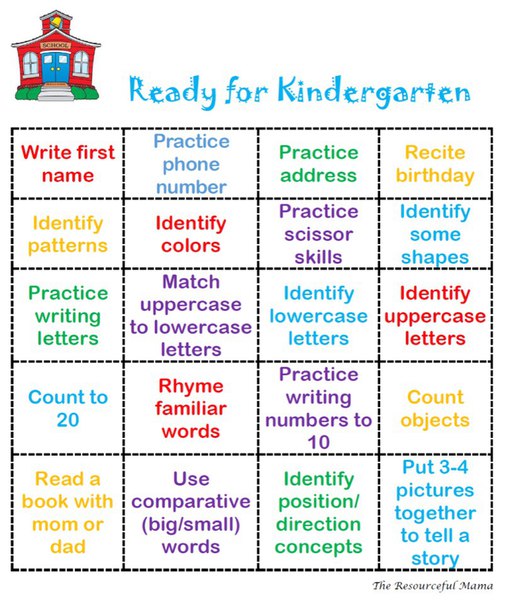
Kindergarten readiness includes motor skills like holding a pencil and using scissors.
Self-care like getting dressed and not needing help in the bathroom are important kindergarten skills.
When kids are getting ready for kindergarten, many families wonder about academic skills. But self-care and social and emotional skills are important for kindergarten readiness, too. For example, does your child need help using the bathroom? Learn about the different kinds of skills kids are expected to have when they start kindergarten.
Language skills
- Speak in complete sentences and be understood by others most of the time
- Use words to express needs and wants
- Understand two-step directions
- Make comparisons and describe relationships between objects like big/little, under/over, and first/last
Reading readiness skills
- Enjoy listening to stories
- Know how to find the first page of a book and which way to flip the pages
- Recognize familiar logos and signs, like stop signs
- Recite the alphabet and identify most of the letters
- Recognize and try to write their own name
- Recognize when two words rhyme (like cat and bat)
- Start to connect letter sounds to letters (like the sound of the first letter in their name)
- Draw a picture to help express an idea
Math skills
- Count from 1 to 10 without skipping numbers
- Match a number to a group of five or fewer items (“I see three cats”)
- Recognize and name basic shapes (square, circle, triangle, rectangle)
- Understand more than and less than
- Arrange three objects in the right order (like from smallest to biggest)
- Name or point to the colors in a box of eight crayons
Self-care skills
- Use the bathroom and wash up on their own
- Get dressed on their own (but may still need help with buttons, zippers, and shoelaces)
- Know and can say their first and last name and age
Social and emotional skills
- Separate from a parent or caregiver without getting overly upset
- Interact with other kids
- Pay attention for at least five minutes to a task an adult is leading, like listening to directions for an activity or discussing the day’s weather during circle time
Fine motor skills
- Use a pencil or crayon with some control
- Use scissors
- Copy basic shapes
- Make distinct marks that look like letters and write some actual letters, especially the ones in their name
- Put together a simple puzzle
Gross motor skills
- Run
- Jump with feet together
- Hop on one foot
- Climb stairs
- Bounce a ball and try to catch it
How to help your rising kindergartner
Kids develop skills at different rates. It’s not unusual for kids to have strong skills in one area and weak skills in other areas. Some states use kindergarten readiness tests to get a sense of which early learners might need extra help in some areas.
It’s not unusual for kids to have strong skills in one area and weak skills in other areas. Some states use kindergarten readiness tests to get a sense of which early learners might need extra help in some areas.
If you’re concerned your child isn’t ready for kindergarten, talk with your child's preschool teacher and work together to come up with a plan to address any trouble spots. You might also want to talk with your child’s health care provider. Learn about the pros and cons of delaying kindergarten for a year.
If your child is headed for kindergarten, explore these steps for a smooth transition. You might also want to see a set of videos on what kindergarten academic skills look like in action.
Key takeaways
Kids develop skills at different rates and might be strong in some areas and weak in others.
Some states use kindergarten readiness tests to see if kids need extra help in certain areas.
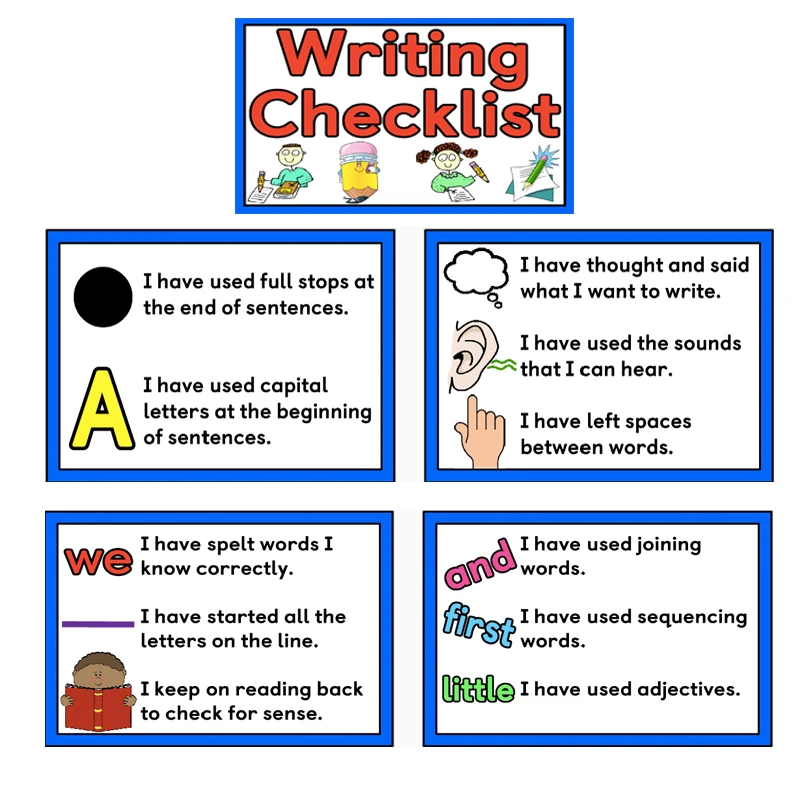
If you’re concerned your child might not be ready for kindergarten, talk to your child’s preschool teacher about how to help.
Tell us what interests you
About the author
About the author
Amanda Morin is the author of “The Everything Parent’s Guide to Special Education” and the former director of thought leadership at Understood. As an expert and writer, she helped build Understood from its earliest days.
Reviewed by
Reviewed by
Kristen L. Hodnett, MSEd is a clinical professor in the department of special education at Hunter College in New York City.
Discover what’s possible when you’re understood.
We’ll email you our most helpful stories and resources.
Learn more
Copyright © 2014-2023 Understood For All Inc.
8 skills that are useful for developing a preschooler and elementary school student
School preparation / Early childhood development
The LogicLike team talks about the skills that are important to master in preschool and primary school age in the first place.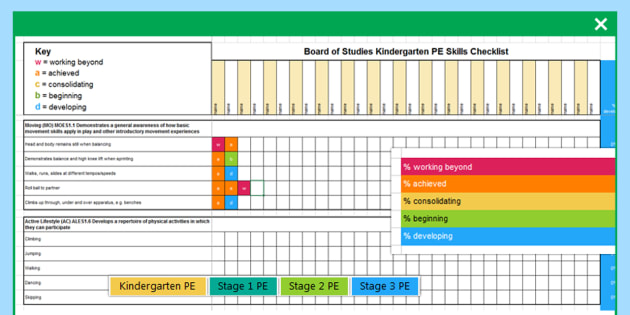
LogicLike is an online platform for the development of children aged 5-12. We teach children to reason and work with information, develop logic and non-standard thinking.
1. Ability and desire to learn: cognitive abilities and interest in learning
Perception, attention, memory, imagination, speech, thinking are mental cognitive processes that make up the ability and desire to learn. For most children, the development of cognitive interest is a natural process laid down by nature. At preschool age, inquisitive children most of all want to discover something new.
Closer to 5-7 years, the child no longer simply perceives information in finished form, as it was before. An inquisitive mind seeks to find answers to questions on its own. An inquisitive preschooler learns to bring different concepts into one system, analyzes them, compares them, looks for patterns and draws conclusions.
Hot interest and curiosity are the basis of independent motivation of a preschooler and a first grader to study.
The elementary school curriculum does not contain separate classes devoted to the development of cognitive abilities. Therefore, the task of teaching the child to learn largely falls on the parents.
High cognitive interest plus developed attention, memory, thinking and other cognitive abilities will help you get used to school without stress, become more independent, proactive and avoid chronic academic failure.
See also: The benefits of entertaining mathematics and solving logic problems.
The ability to learn independently cannot be overestimated. Technology is developing many times faster than it was 20 years ago, and specialists of any profession are in the race for new knowledge. Try to imagine what will happen in another 20 years.
2. Creative thinking: the ability to think outside the box, contrary to patterns
The ability to create something new, unconventional - this is how classical psychology defines the concept of "creative thinking". You should not associate it exclusively with art: extraordinary solutions are welcome in any field of activity, be it acting or mobile application development.
You should not associate it exclusively with art: extraordinary solutions are welcome in any field of activity, be it acting or mobile application development.
At the age of 5-7 years, thinking is not constrained by stereotypes and it is easier for a child to learn to be “creative”. This will help in the future to get out of any difficult situations, simply connecting creative thinking.
See also: 10 ideas and exercises to develop creativity.
The ability to think outside the box is useful not only in everyday life. For example, engineer and ornithologist Eiji Nakatsu developed a rounded nose for a bullet train. The idea came from observing the kingfisher, a bird whose streamlined beak allows it to fish easily, plunging into the water without splashing. This train design reduced air resistance and energy costs.
3. The ability to think logically: we develop logical and mathematical intelligence
Some everyday and educational problems can be solved creatively. But in most cases, when an objective, balanced approach is needed, creativity is not enough. Logical thinking comes to the rescue:
But in most cases, when an objective, balanced approach is needed, creativity is not enough. Logical thinking comes to the rescue:
- ability to think;
- to prove the truth or falsity of judgments;
- make informed decisions;
- explain your position to yourself and others.
When a child pumps logical thinking and mathematical abilities, he learns to use specific concepts, "weigh" options and make decisions.
Solving entertaining logic problems is a proven way to develop logic in preschoolers and younger students. Is your child 5-7 years old? This is the perfect time to start.
Day after day, more than 100,000 students
complete 10-20 assignments on the LogicLike website. And how much can you? Choose where to start:
Riddles and questions Riddles and questions
Logic tasks Logic tasks
Children with developed logical and mathematical intelligence can easily cope with school mathematics. In grades 3-4, they win mathematical olympiads and, in general, have more chances for a breakthrough in overall intellectual development.
In grades 3-4, they win mathematical olympiads and, in general, have more chances for a breakthrough in overall intellectual development.
4. Spatial thinking and imagination: developing visual-spatial intelligence
It is possible to create 3D pictures in your head, look at them in great detail and rotate them as you like with the help of spatial thinking and imagination. By developing these abilities, the child learns to navigate in space, recognize directions of movement, determine the sides of the horizon, understand the position of objects in space and perceive their shape.
This is interesting: Games and tasks for the development of spatial thinking of preschoolers.
Universal skills for success in any endeavors
The ability and desire to learn, creative, logical-mathematical and spatial thinking are components of the intellect and are absolutely necessary for both children and adults. However, this is not enough to achieve success.
Special, "hard" skills (hard skills) affect a person's success in a particular activity. They, too, can and should be developed from childhood, especially if the child has obvious inclinations and interests.
What can determine the success of a person in a variety of activities? General, soft skills It is equally useful in study, work and personal affairs. “Soft” skills are the basis for the development of special skills and human efficiency in everything.
We have identified 4 universal skills, qualities (their groups) that will definitely be useful to your child at school and later in life.
5. Communication skills: the ability to communicate and speak in public
The ability to conduct a dialogue, negotiate, convince somewhere, and give in somewhere, helps to join the team and find a common language with any person. A sociable person is more likely to reveal his abilities and succeed than someone who is stuck in communication.
6. Ability to work with information
When the information in the head is not sorted out, but falls into a heap, it is much more difficult to find and use something valuable.
For effective work and study, it is important to be able to:
- evaluate information for accuracy and reliability;
- to filter out the superfluous and empty, to highlight the main thing;
- combine elements into semantic groups;
- memorize and find the right information in time.
"Who owns the information, he owns the world."
Nathan Rothschild
7. Self-organization, time management
Sometimes it seems that a person's life is organized by circumstances. School drives into the framework of lessons for 45 minutes, work creates the boundaries of an 8-10-hour working day.
But without the ability to plan things and manage your time, it is difficult to be productive. This is something that is not taught in school, but without which it is difficult to do without in life.
This is something that is not taught in school, but without which it is difficult to do without in life.
“I’ve been thinking about how to kill time more than once!” said Alice from Lewis Carroll's fairy tale to the Hatter. He answered her:
“How can he (time) like this? If you didn’t quarrel with him, you could ask him for anything you want.
8. Personal qualities: leadership, will, perseverance
Purposeful, stress-resistant, responsible, proactive, hardworking, able to cope with routine tasks - like a torn line from a resume of a top specialist, isn't it? All these qualities are classified as soft skills. They are not related to a specific profession, but without them any work is difficult.
Personal qualities are formed in childhood and depend on upbringing. It is important in this regard to correctly “distribute responsibilities” between the school and parents.
Abilities and skills open up a world of possibilities for the child
It all starts with the discovery of the inclinations laid down by nature, which are easiest to develop into abilities. But without effort, even rich inclinations run the risk of remaining in the stage of unsprouted grains.
But without effort, even rich inclinations run the risk of remaining in the stage of unsprouted grains.
A vivid example is in the biography of the Russian painter Vasily Surikov. His inclinations for drawing appeared early, but by the time he entered the art academy, they were not developed to a sufficient degree, according to teachers.
“Is this your work? Yes, for such drawings, you should even be forbidden to walk past the Academy!
, the examiner remarked sternly.
Surikov did not agree, in three months he completed a three-year course with the artist Dyakonov and successfully entered. To make this example even more revealing, imagine that Surikov never discovered his ability to draw.
How do you like it if your child agrees with the school teacher, they say, “well, there are no abilities for mathematics and logic - a humanist”?
At any age, it's not too early and not too late!
In childhood, the potential for the distant future is laid. But does this mean that it is already too late for adults to develop their abilities? Not at all.
But does this mean that it is already too late for adults to develop their abilities? Not at all.
This is confirmed by people who debunk myths by their example. Belarusian biathlete Daria Domracheva received two higher economic educations before realizing in sports.
Self-taught artist Henri Rousseau began painting at a mature age, with only military service and customs experience behind him. It is never too late to develop and discover a second wind.
What else is worth remembering?
- Listen to your child and help him develop in what he likes. Do not try to realize only your ambitions, do not strive to grow a new Hans Zimmer or Steve Jobs.
- Lay down the basic abilities that will definitely come in handy for any teenager and adult. For this, he will definitely thank you.
- Continue the development of thinking, cognitive interest and other skills with LogicLike. Our activities are fun for kids and adults!
On the LogicLike platform, we teach and develop children in a playful way, from simple to complex.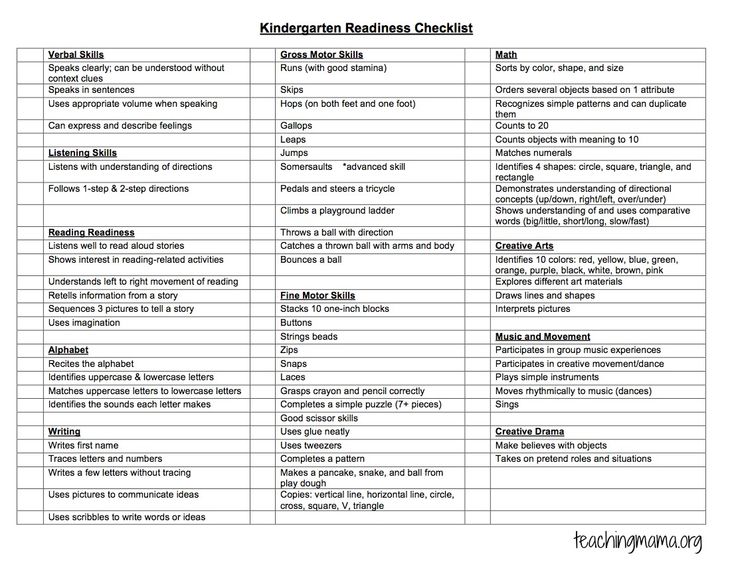 Study online at any convenient time.
Study online at any convenient time.
Share with friends:
We will teach you to reason and work with information
More than 150,000 children and parents from all over the world are already developing logic and thinking on the LogicLike website.
Start classes! Start classes!
7 Skills a Child Should Learn Before Kindergarten
What 7 Skills or Skills Should a Child Learn Before Entering Kindergarten? Find out how they will help your child in the process of learning and adapting to a new team.
Contents
When it comes time to send a child to kindergarten, parents are concerned about issues related, rather, to his physical and psychological needs - whether the baby will be able to eat on his own, what they feed the children, what clothes to wear, what to do if the baby will cry? They do not think about the need to instill in him skills and abilities that will help the child quickly adapt to the team and simplify the learning process.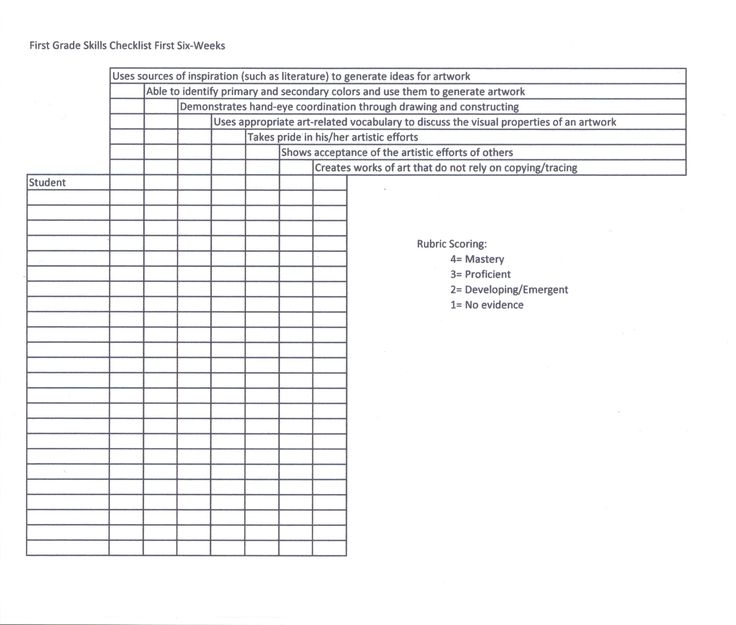 Just imagine how much attention your child will receive if there are 20 children in the group who need to be dressed and shod, and only two adults - a teacher and a nanny. It will be better if every child learns at least simple things before starting kindergarten. What are 7 skills to instill in a child before entering preschool?
Just imagine how much attention your child will receive if there are 20 children in the group who need to be dressed and shod, and only two adults - a teacher and a nanny. It will be better if every child learns at least simple things before starting kindergarten. What are 7 skills to instill in a child before entering preschool?
Read also: Adapting a child to kindergarten: what parents need to know
they will need the ability to sit for 20 minutes, as there are training sessions with the kids. It will not be easy for an unprepared child to spend such a period of time in a calm state. Therefore, parents need to teach their children perseverance. Children's performances can help with this, where the performance usually lasts about half an hour.
At first it will be difficult for the child to concentrate on the performance for so long. After 10 minutes, small children lose interest in what is happening, but do not give up - over time, the baby will learn to hold attention longer.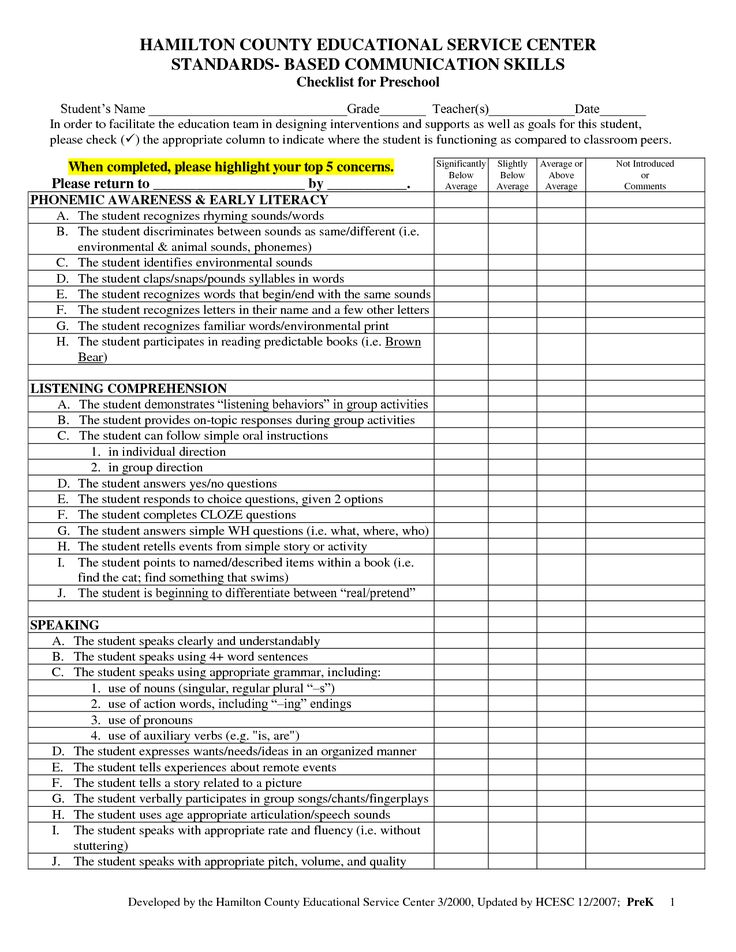 To develop the skill of perseverance, make it a rule to train your child at home, arranging short scenes with the participation of his favorite toys. Watching cartoons for children under the age of three is not recommended.
To develop the skill of perseverance, make it a rule to train your child at home, arranging short scenes with the participation of his favorite toys. Watching cartoons for children under the age of three is not recommended.
For kindergarten to bear fruit, the child must learn to listen. To some extent, visits to puppet theaters and home dramatizations of performances can help develop this skill. However, do not forget that in such scenes, children mostly perceive what is happening visually. In order for a child to learn to listen, it is useful to read children's books to him daily. Try to do this at least twice a day - before daytime and nighttime sleep.
3. Learning to follow instructions sequentially
Various games and activities in kindergarten often require the child to be able to memorize and reproduce simple actions in a given sequence. In order for the baby to take part in such educational games and cope with the task on an equal basis with other children, you need to teach him to follow the instructions of adults even before visiting the garden.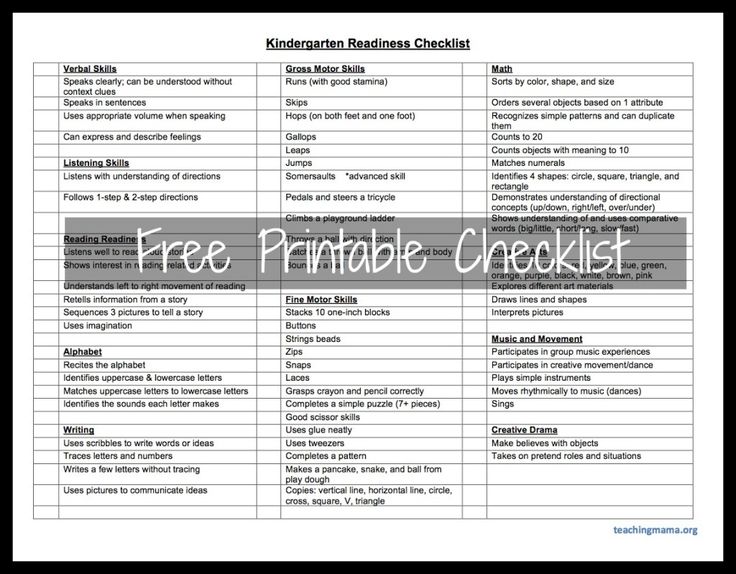
Occasionally ask your child to follow a few simple steps in sequence, such as wiping the mouth, removing the cup from the table, picking up crumbs. The difficulty for the baby is usually to remember the information. If he could not do everything in the specified sequence, remind him of the procedure and ask him to do it all over again.
4. Learning to deal with tacks and buttons
Before enrolling children in a kindergarten, you should make sure that it is able to take care of itself at least a little. The duties of educators include helping the kids when they need to get dressed or put on shoes, but if possible, it is better to make their work easier by teaching the child to put on his pants after the toilet, fasten buttons and buttons. If the baby is still unable to cope with the button on the trousers, buy trousers with an elastic band. While at home, do not miss the opportunity to teach your child to fasten buttons and buttons.
Read also: how to teach a child to dress and undress independently
5.
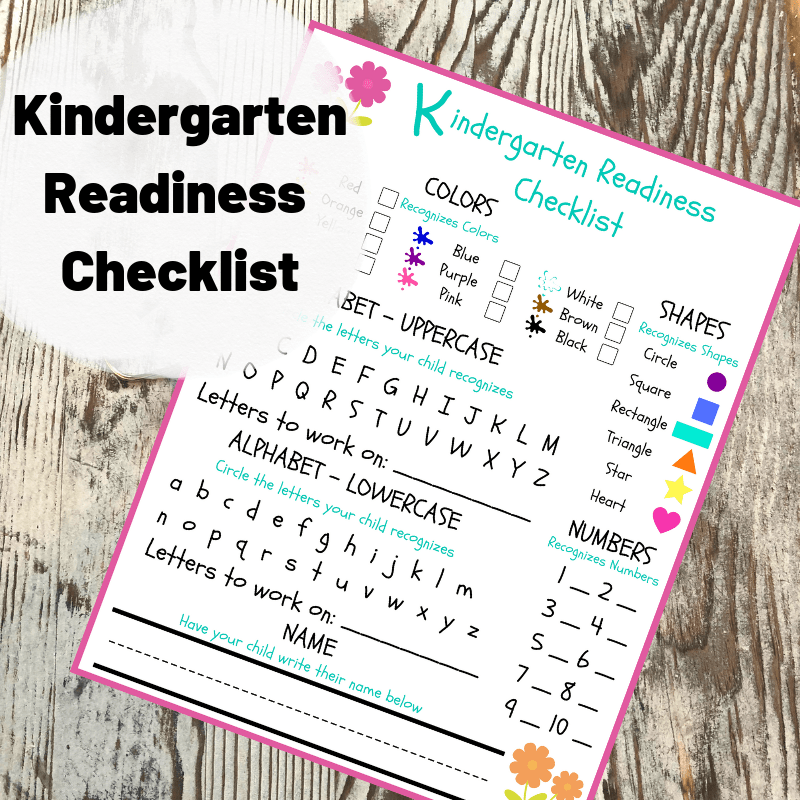 Learning to put on shoes
Learning to put on shoes
Tying shoelaces is one of the most difficult tasks. Usually children master this skill only by the age of five, and before this age it is better to provide them with Velcro shoes, which even a crumb can easily handle. Another difficult task for the baby is to recognize which shoe is worn on the right foot, and which one is on the left.
In order for the children to remember how to properly put on shoes, tell them that the toes of the shoes should look at each other (they seem to be friends) - this is correct. If they turned away, as if they had a quarrel, this is wrong.
6. The ability to share and exchange toys
Most parents try to instill in their children the ability to share from the age of one. At this time, as if everything is going smoothly, the children willingly let another child play with their doll or tank. From the age of two, when the awareness of personal belonging comes to babies, they increasingly show greed.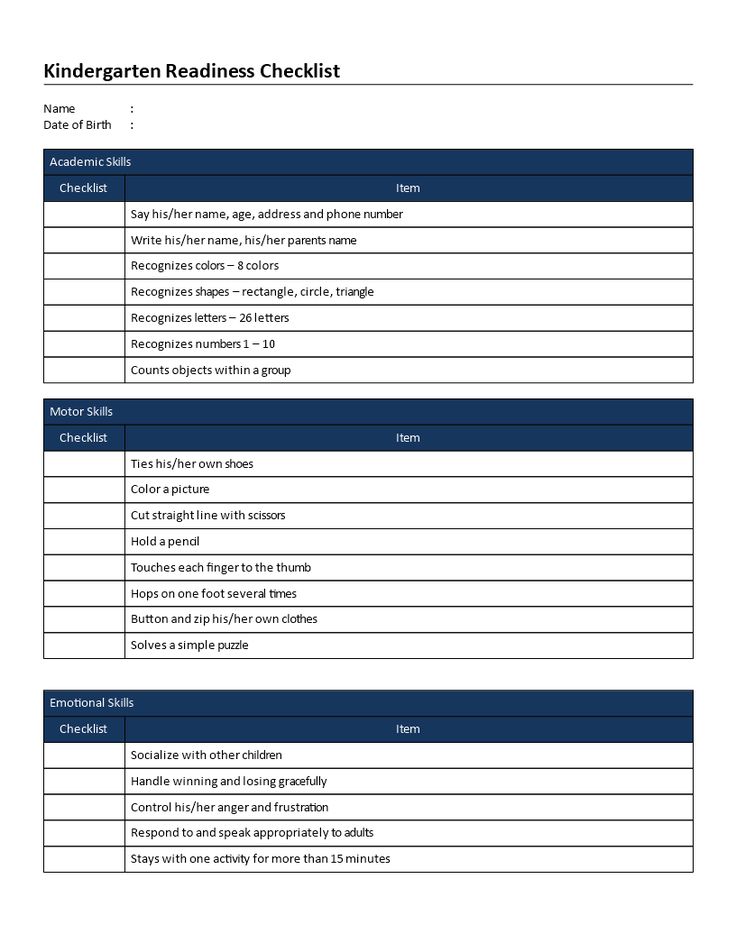 It’s just that children don’t yet understand that a thing given for a while will be returned to them, the fear of not getting it back prevents them from being generous.
It’s just that children don’t yet understand that a thing given for a while will be returned to them, the fear of not getting it back prevents them from being generous.
Sometimes it seems to parents that their attempts to teach their child to share or change with others will not lead to anything, but don't give up. Over time, kids will acquire this skill, and fairy tales about greedy children, as well as about toys that return to their owner, will help them in this. Encourage your son or daughter to swap things with other children, paying attention to the fact that by giving away his toy, the baby receives another in return. Teach that then you need to return the toy to the owner, and take your own back. You can't do without the ability to share and exchange things in kindergarten.
7. Instilling good manners
When it comes to children's ability to show good manners, it means that they should have an idea of the elementary rules of good manners and behavior.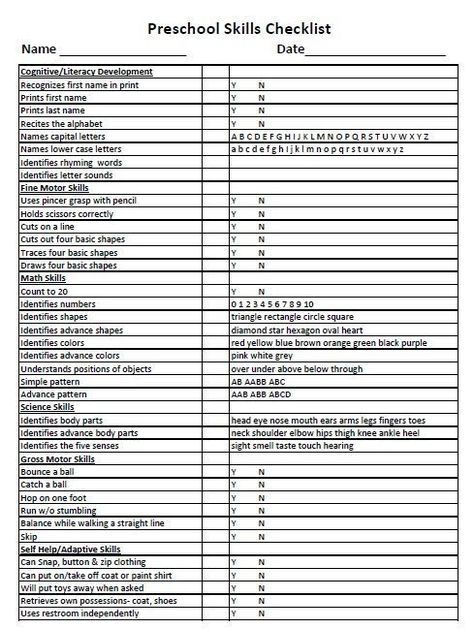 It’s good when a child knows how to patiently wait for their turn, knows when they say “thank you” and “please”, and also shows friendliness to others (we also read about the rules of behavior for children at the table in this article).
It’s good when a child knows how to patiently wait for their turn, knows when they say “thank you” and “please”, and also shows friendliness to others (we also read about the rules of behavior for children at the table in this article).
When planning to enroll your child in kindergarten, you should make sure that he has already developed the skills mentioned above. If this is the case, it will be easier for the baby to learn new knowledge, he will quickly adapt to the team.
- We also read: If parents thought about the consequences of their actions: 4 examples of unsuccessful adaptation to kindergarten
- Read more on the topic of pre-kindergarten skills: What a child should be able to do before kindergarten - 4 useful skills
- Reading how to wake up a child in the morning to kindergarten without tears, torment and whims
